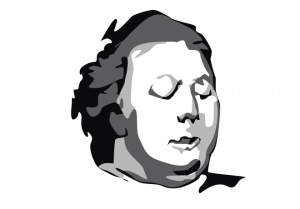Martha Tabram
Contents
Martha Tabram
Martha Tabram was brutally murdered in the early hours of 7th August 1888.
Her mutilated body was found on the first floor landing of George Yard Buildings by John Saunders Reeves as he left for work.
PC Thomas Barrett 226H was summoned by John Reeves, who in turn sent for a doctor. Dr Timothy Robert Killeen arrived to investigate the body.
As there wasn't a public mortuary in Whitechapel the police sent Martha's body to the 'deadhouse' belonging to the workhouse infirmary in Old Montague Street.
Early Life
Although having supposedly told her landlady, Mary Bousfield in 1888, that her real name was Staples or Stapleton, Martha was actually born Martha White. She was born at 17 Marshall Street, London Road, Southwark on 10th May 1849.
Martha was the daughter of Charles Samuel and Elisabeth (née Dowsett) White.
- Martha had four siblings, detailed here
Married Life
At the time of her death Martha was still married to Henry Samuel Tabram, who at the time of Martha's death resided at 6 River Terrace, East Greenwich. They had, however, been separated for some thirteen years.
Martha and Henry Samuel Tabram were married at Trinity Church in the parish of St Mary, Newington, on Christmas Day 1869.
At the time of their marriage they were residing at Pleasant Place.
By February 1871 they had moved to 20 Marshall Street, very close to where Martha had been born.
In their short time living together the couple had two sons. Frederick John was born in February 1871 and Charles Henry was born in December 1872.
Due to Martha’s heavy drinking Henry left her in 1875.
After she was separated from Henry Martha had an on-off relationship with carpenter Henry Turner, which lasted around twelve years.
Post-Mortem
Dr Timothy Robert Killeen conducted the post-mortem.
The summary of wounds given to the inquest on 9th August 1888 were:
- An effusion of blood between the scalp and the bone
- The brain was pale but healthy
- At least twenty-two stab wounds to the trunk
- The left lung was penetrated in five places
- The right lung was penetrated in two places
- The heart was rather fatty
- The heart was penetrated once
- Blood was present in the pericardium
- The liver was penetrated in five places
- The spleen lung was penetrated in two places
- The stomach was penetrated in six places
- The lower portion of the body was penetrated in one place
- Death was due to haemorrhage and loss of blood
Dr Killen went on to make the following deductions:
- There was no evidence of a struggle
- One of the wounds, he contended, might have been made by a left-handed person, but the rest appeared to have been inflicted by a right-handed person
- Two different weapons had been used
The Inquest
On 9th August 1888 George Collier, the deputy coroner, opened the proceedings at Martha Tabram's inquest, which was held in the library of the Working Lads’ Institute, Whitechapel Road.
At the opening of the inquest Martha still hadn't been identified. Different witnesses had provided different names.
In light of this and other potential uncertainties surrounding the case George Collier adjourned the inquest for two weeks.
George Collier is reported to have said: ‘It was one of the most dreadful murders anyone could imagine. The man must have been a perfect savage to inflict such a number of wounds on a defenceless woman in such a way'.
On 23rd August 1888 George Collier reopened the inquest at the Working Lads’ Institute. The public were allowed into the building on this occasion.
The victim was formally identified as Martha Tabram. The inquest heard an in-depth account of Martha's character and history, as well as the circumstances surrounding her death. The only important witness was Mary Connelly ("Pearly Poll"), who was wrapped in an old green shawl and speaking in a low, husky voice. The inquest heard her account of the Bank Holiday night out in Whitechapel with Martha and the two soldiers.
The inquest was then brought to an end.
The Verdict
The jurors returned a unanimous verdict of wilful murder against some person or persons unknown. Martha’s death was registered two days later.
Conclusion
Martha's murderer was never identified. There's no solid proof pointing to any of the soldiers involved in the case.
Many Ripper experts believe a soldier was involved in Martha's murder. This is partly why Martha is not considered to be one of Jack The Ripper's victims.
